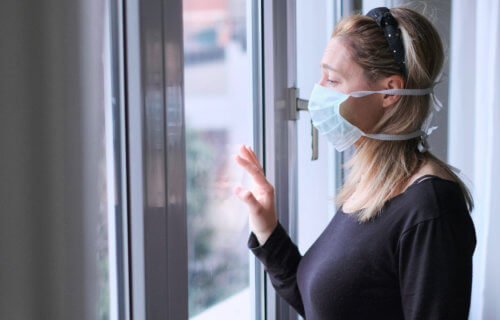PITTSBURGH — Self-isolation and social distancing are part of the solution to COVID-19, as most doctors would agree. A surprising new study now suggests that prolonged periods of isolation and stress may actually increase one’s vulnerability to upper respiratory infections, and potentially the coronavirus.
This entire year has felt like a no-win situation for so many people, and these latest findings may be as deflating as they are confusing. It’s no secret by now that COVID-19 is super contagious and easily spread among people. So how is self-isolating helping the virus? According to researchers at Carnegie Mellon University, the constant “interpersonal stressors” that come along with quarantining and self-isolation may cause an increased vulnerability to various upper respiratory viruses, including perhaps COVID-19.
In other words, the stress one battles from avoiding friends and family and staying home all the time is making them more susceptible to respiratory viruses. This phenomenon hasn’t been proved regarding COVID-19 specifically, but such a relationship has been seen with cold and flu viruses.
“We know little about why some of the people exposed to the coronavirus that causes COVID-19, are more likely to develop the disease than others. However, our research on psychological factors that predict susceptibility to other respiratory viruses may provide clues to help identify factors that matter for COVID-19,” comments Sheldon Cohen, the Robert E. Doherty Professor of Psychology at Carnegie Mellon University, in a release.
Previous research links stress to cold, flu viruses
Professor Cohen has spent his entire career examining the influence of social, psychological, and behavioral factors on upper respiratory illnesses.
“The focus on the pandemic up until now has been changing behaviors to avoid exposure to the virus,” Cohen says. “In our work, we intentionally exposed people to cold and influenza viruses and studied whether psychological and social factors predict how effective the immune system is in suppressing infection, or preventing or mitigating the severity of illness.”
Professor Cohen’s previous work shows that people dealing with lots of interpersonal stressors have a greater chance of falling ill when exposed to cold viruses. Now, he is of the opinion that a similar relationship may be at play with COVID-19. As communities all over have advocated for social isolation, countless Americans report feeling lonelier, losing a source of income, or fighting much more often with their housemates/family members. Cohen believes all of these stressors may be making people more susceptible to the coronavirus.
Also, Cohen’s previous work with cold viruses finds that people battling high levels of stress overproduce pro-inflammatory cytokines in response to a cold or influenza viral infection. That additional inflammation would usually result in a higher risk of developing illness. Similarly, COVID-19 research shows that more pro-inflammatory cytokines are indeed linked to more severe symptoms. All of this supports the theory that stress can induce a more severe coronavirus infection and symptoms.
Staying social under isolation key to staving off COVID-19?
Conversely, however, professor Cohen’s work also suggests that a strong social support network can help an individual build up a “protective shield” against viral respiratory infection.
“If you have a diverse social network (social integration), you tend to take better care of yourself (no smoking, moderate drinking, more sleep and exercise),” professor Cohen concludes. “Also if people perceive that those in their social network will help them during a period of stress or adversity (social support) then it attenuates the effect of the stressor and is less impactful on their health.”
The study is published in Perspectives in Psychological Science.
